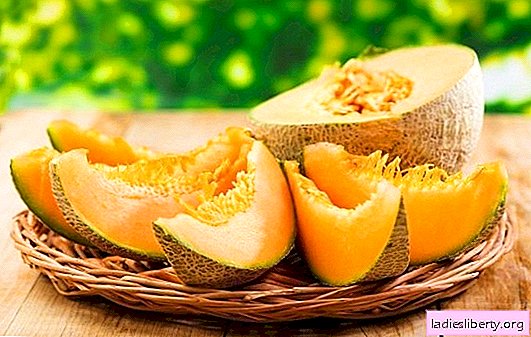
Poisoning with melon can be as easy as with any fruit and vegetables. This happens especially often in the summer, before the start of the season, and in late autumn or winter, if the fruits are stored for a long time in violation of the rules.
In spring and summer, nitrates and other chemicals, which are used to accelerate ripening, cause poisoning.
At the height of the season (August-September), poisoning can occur due to a violation of the integrity of the peel, when due to infection in the pulp, pathogens multiply rapidly in conditions favorable to them: high humidity, suitable temperature, high sugar content.
Useful properties of melon
In addition to pleasant taste, melon contains many vitamins (A, C, E, group B - rutin, folic acid), minerals (phosphorus, iron, potassium, calcium, silicon), a large amount of fiber.
Therefore, it is useful for the skin, has a beneficial effect on blood vessels, improves the blood formation process, increases hemoglobin, and immune status.
In almost all organs and systems, melon has a positive effect, improving their functions.
By stimulating the functioning of the kidneys, melon helps to reduce swelling.
Fiber contained in it enhances intestinal motility and copes with constipation, normalizes microflora.
Overeating - is it poisoning?
Given that fiber irritates the intestinal mucosa and acts as a laxative, even with melon overeating, diarrhea can occur. Dietary fiber is digested for a long time in the stomach, this process continues in the intestine. When consuming a large amount of melon, in addition to diarrhea, heaviness occurs in the stomach, sometimes pain, severe flatulence, nausea, and weakness. The body temperature does not increase, and the symptoms disappear in a day or two, sometimes in a few hours, if there is no individual intolerance. To avoid such situations, it is recommended to eat melon as a separate dish, two hours after eating or before eating. As a dessert, immediately after lunch, you should not eat it, so as not to disrupt the digestive process.
If this condition arose in a healthy person after overeating, this may indicate intolerance to melon. Most likely, you have to abandon this delicious product.
Contraindications to the use of melon
There are contraindications for melon:
• diabetes mellitus (due to its high sugar content);
• pathology of the gastrointestinal tract - peptic ulcer (due to the large number of coarse dietary fiber);
• diseases of the urinary system that occur with edema;
• pregnancy with suspected gestosis;
• age up to one year (children still lack the necessary enzymes for digestion).
Symptoms of nitrate poisoning
Melon poisoning is one of the most powerful and hazardous to health. Depending on the etiological factor - the cause of poor health, emit:
• nitrate poisoning;
• Toxic infection caused by pathological microflora.
Nitrates enter the body with melon in spring or early summer, when they are used in large quantities to accelerate ripening and produce full-fledged fruits. In such cases, with melon poisoning, symptoms develop 3-7 hours after eating. Appear:
• sharp weakness, lethargy, dizziness and headaches;
• nausea and vomiting, depending on the severity of the condition;
• frequent, watery, loose stools of a dark color;
• bitterness in the mouth;
• pain and heaviness in the right hypochondrium;
• subikterichnost sclera and skin integument.
Pain in the right side, discoloration of the skin, and bitterness in the mouth are associated with liver damage due to nitrate poisoning. In severe poisoning, a sharp dehydration of the body occurs due to frequent vomiting and profuse diarrhea. This can lead to the development of convulsive syndrome. Body temperature does not change.
It is recommended that you urgently call a doctor to avoid further complications.
The defeat of the cardiovascular system
Poisoning with nitrates is very dangerous, because not only the digestive tract, but also other organs and systems are affected. This is due to the mechanism of action of nitrates: when ingested as a result of chemical reactions, toxic nitrites are formed, under the influence of which hemoglobin loses its oxygen carrier properties, turning into methemoglobin. Severe hypoxia develops. Death by suffocation may occur. When examining a patient, this is manifested:
• lip cyanosis;
• acrocyanosis (cyanosis of the tip of the nose and terminal phalanges of the fingers);
• shortness of breath;
• heartbeats.
In case of untimely assistance, acute vascular insufficiency develops.
Damage to the nervous system
As a result of developing hypoxia, the functions of the nervous system are suppressed, the following appear:
• sharp inhibition;
• lethargy;
• hyperhidrosis (excessive sweating);
• throbbing headaches;
• violation of coordination;
• loss of consciousness.
In blood tests, anemia is determined. The degree of poisoning is determined by the content of methemoglobin in the blood. Platelet aggregation is impaired, resulting in bleeding.
A similar condition develops as a result of the effect of nitro compounds on the vessels of the brain: they sharply expand, which leads to a systemic drop in blood pressure.
Microbe poisoning with melon
If pathogenic microflora enters the body during melon poisoning, symptoms develop rapidly. Within 2 hours, the temperature rises to febrile numbers (above 38 C), dyspeptic syndrome develops:
• repeated profuse diarrhea;
• nausea;
• vomiting;
• lack of appetite.
Poisoning is accompanied by severe abdominal pain and severe asthenic syndrome:
• dizziness;
• headaches;
• severe weakness.
As with any intestinal infections, in severe cases, dehydration develops. Its signs:
• dry mouth, severe thirst;
• dry skin and mucous membranes: the skin is taken in a crease that does not straighten;
• a small amount of urine excreted: it becomes a concentrated dark color with a pungent odor;
• excruciating headaches;
• a sharp decrease in blood pressure;
• tachycardia;
• confusion and prolonged loss of consciousness.
Melon Poisoning Treatment
With melon poisoning, treatment depends on what caused this condition.
If diarrhea, nausea, and vomiting occur as a result of overeating, in most cases medical care is not required. After a certain time, the condition normalizes, the symptoms disappear.
If loose stools and vomiting do not stop quickly, you can take the following measures:
• take any sorbent (activated carbon - 6 - 8 tablets once, Polysorb, Smecta, white coal, Enterosorbent);
• drink large quantities of clean, non-carbonated water in small portions to prevent dehydration;
• do not eat ordinary food;
• You can drink strong black tea.
Urgent action
In case of melon poisoning, treatment, if the condition is not serious, consists in the need to immediately clear the stomach of the toxin (if a lot of time has not passed since the poisoning). To this end:
• induce vomiting;
• flush the stomach with a weak solution of manganese or lightly salted water at room temperature;
• make a cleansing enema (water should be cool so that it is not absorbed in the intestine);
• accept sorbents;
• drink warm saline or large quantities of water;
• eat only sparing food: neutral cereals without spices, marinades, seasonings, irritating the mucous membrane;
• take an antipyretic at a body temperature above 380 C (paracetamol).
In case of poisoning a child or a pregnant woman, you must call a doctor, do not self-medicate. If the condition is serious and there are signs of dehydration, urgent hospitalization is necessary - this is not treated at home. This also applies to nitrate poisoning of melons - treatment should be carried out in a hospital environment in order to avoid severe complications.
Poison Prevention
To avoid such an unpleasant phenomenon, you need to adhere to several rules:
• there is a melon only in August - September, when it fully ripens;
• eat only whole, intact fruits, without spots and cuts on the peel;
• do not eat melon that has been stored in cut form for more than a day, even if it was in the refrigerator;
• do not overeat - consume in moderation between main meals;
• buy only from trusted sellers.
If you follow these tips, a ripe melon will give you pleasure while eating and you will be able to avoid severe poisoning.











